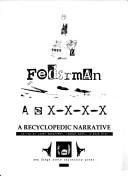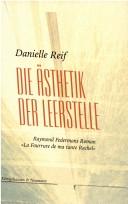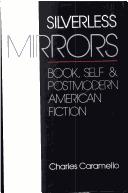| Listing 1 - 10 of 10 |
Sort by
|
Book
ISBN: 9782915978292 2915978298 Year: 2008 Volume: *4 Publisher: Paris Argol
Abstract | Keywords | Export | Availability | Bookmark
 Loading...
Loading...Choose an application
- Reference Manager
- EndNote
- RefWorks (Direct export to RefWorks)
Book
ISBN: 9782756101224 Year: 2008 Publisher: Paris Scheer
Abstract | Keywords | Export | Availability | Bookmark
 Loading...
Loading...Choose an application
- Reference Manager
- EndNote
- RefWorks (Direct export to RefWorks)
Authors, French --- Jews --- Federman, Raymond --- Childhood and youth.
Book
ISBN: 9781785277962 9781785277955 1785277960 9781785277979 1785277979 Year: 2021 Publisher: London : Anthem Press,
Abstract | Keywords | Export | Availability | Bookmark
 Loading...
Loading...Choose an application
- Reference Manager
- EndNote
- RefWorks (Direct export to RefWorks)
Raymond Federman (1928-2009) is known as a scholar of Samuel Beckett, postmodern theorist and avant-garde novelist. Like Beckett, he was also a self-translator, though unlike Beckett his first language was French and he composed his most significant works in English. In this sense, he took Beckett's journey in reverse. Federman's life was, in many ways, a Beckettian journey. He escaped deportation to Auschwitz, where all of his immediate family perished, thanks to his mother pushing him into a closet. Years of lonely wandering followed. Federman explicitly describes his own life in Beckettian terms, and his postmodern novels are thick with intertextual references, with Beckett as the main source. This book offers the first examination of these references, in light of Federman's contribution to critical theory.
This study is focused on Federman's most significant novels, published between 1971 and 1982. Federman's two tongues make for a doubled discourse, one in which the boundaries between English and French become porous. He uses fragments of Beckett, Joyce and others (including French poststructuralists) to undermine the gendered identity of his own autobiographical creations. Federman's use of Beckett, his intertextual strategies and choices, highlight the queer potential of his master's work.
Intertextuality. --- Federman, Raymond --- Beckett, Samuel, --- Criticism and interpretation. --- Criticism and interpretation.
Book
ISBN: 1438433832 1441687033 9781441687036 9781438433837 9781438433813 1438433816 1438433824 Year: 2010 Publisher: Albany State University of New York Press
Abstract | Keywords | Export | Availability | Bookmark
 Loading...
Loading...Choose an application
- Reference Manager
- EndNote
- RefWorks (Direct export to RefWorks)
A comprehensive examination of one of the twentieth century's most innovative writers and critics.
Criticism --- Narration (Rhetoric) --- Postmodernism (Literature) --- Experimental fiction, American --- History --- History and criticism. --- Federman, Raymond --- Knowledge --- Literature. --- Criticism and interpretation. --- History and criticism --- Rhetoric --- Discourse analysis, Narrative --- Narratees (Rhetoric)

ISBN: 1879691515 9781879691513 Year: 1998 Publisher: San Diego, CA : San Diego State University Press,
Abstract | Keywords | Export | Availability | Bookmark
 Loading...
Loading...Choose an application
- Reference Manager
- EndNote
- RefWorks (Direct export to RefWorks)
Fluxus (Group of artists) --- Art, Modern --- Avant-garde (Aesthetics) --- Performance art. --- Fluxus (Groupe d'artistes) --- Art --- Avant-garde (Esthétique) --- Art de performance --- History --- Histoire --- Maciunas, George, --- Avant-garde (Esthétique) --- Artists' books --- Postmodernism (Literature) --- Artist books --- Book art --- Book works (Art) --- Books, Artists' --- Bookworks (Art) --- Federman, Raymond. --- Literary movements --- Literature, Modern --- Modernism (Literature) --- Post-postmodernism (Literature) --- Books --- Conceptual art --- Federman, Raymond

ISBN: 3826030745 9783826030741 Year: 2005 Volume: 517 Publisher: Würzburg Königshausen & Neumann
Abstract | Keywords | Export | Availability | Bookmark
 Loading...
Loading...Choose an application
- Reference Manager
- EndNote
- RefWorks (Direct export to RefWorks)
Holocaust, Jewish (1939-1945), in literature. --- Experimental fiction --- Autobiographical fiction, French --- Diskontinuität. --- Literarischer Stil. --- Das @Fragmentarische. --- Erzähltechnik. --- History and criticism. --- Federman, Raymond. --- Perec, Georges, --- La Fourrure de ma tante Rachel.
Book
ISBN: 9782020973977 2020973979 Year: 2008 Publisher: Paris: Seuil,
Abstract | Keywords | Export | Availability | Bookmark
 Loading...
Loading...Choose an application
- Reference Manager
- EndNote
- RefWorks (Direct export to RefWorks)
Après avoir redéfini la stratégie du roman autobiographique dans Est-il je ? L'auteur s'interroge dans ce nouvel essai sur la validité du concept d'autofiction. Depuis quelques années, ce terme est en effet entré dans l'usage sans que l'on puisse déterminer s'il a pour vocation d'absorber les anciennes catégories - autobiographie, roman personnel, récit - ou de désigner un type réellement nouveau d'écriture du moi. Pour sortir de cette confusion il fallait tirer les fils de l'histoire. C'est pourquoi Philippe Gasparini s'attache d'abord à resituer le contexte dans lequel Serge Doubrovsky a lancé son néologisme, puis retrace les débats qu'il a soulevés. Les différentes définitions données par Jacques Lecarme, Philippe Lejeune, Gérard Genette, Régine Robin, Vincent Colonna, Marie Darrieussecq, sont ainsi mises en perspective avec les réflexions d'Alain Robbe-Grillet, Paul Nizon, Raymond Federman, Philippe Vilain ou Philippe Forest sur leur pratique de l'écriture. Ce parcours montre comment l'autonarration est peu à peu sortie de la clandestinité pour revendiquer un véritable statut littéraire. Il permet de dégager les principaux traits qui la caractérisent. Et il suggère que ce nouveau genre, fondé sur le doute, le fragment et l'altérité, peut aussi constituer un acte de résistance.
Non-fiction --- Autobiographical fiction --- Biography as a literary form --- History and criticism --- Biography as a literary form. --- Autobiographical fiction. --- avtobiografija --- History and criticism. --- avtobiografska literatura --- avtorski pripovedovalec --- francoska književnost --- Doubrovsky, Serge --- Lecarme, Jacques --- Lejeune, Philippe --- Genette, Gérard --- Robin, Régine --- Colonna, Vincent --- Darrieussecq, Marie --- Robe-Grillet, Alain --- Nizon, Paul --- Federman, Raymond --- Vilain, Philippe --- Forest, Philippe --- Forest, Philippe. --- Avtobiografija --- Autobiographical fiction - History and criticism
Book
ISBN: 1785277960 1785277979 1785277952 Year: 2021 Publisher: London : Anthem Press,
Abstract | Keywords | Export | Availability | Bookmark
 Loading...
Loading...Choose an application
- Reference Manager
- EndNote
- RefWorks (Direct export to RefWorks)
Raymond Federman (1928-2009) is known as a scholar of Samuel Beckett, postmodern theorist and avant-garde novelist. Like Beckett, he was also a self-translator, though unlike Beckett his first language was French and he composed his most significant works in English. In this sense, he took Beckett's journey in reverse. Federman's life was, in many ways, a Beckettian journey. He escaped deportation to Auschwitz, where all of his immediate family perished, thanks to his mother pushing him into a closet. Years of lonely wandering followed. Federman explicitly describes his own life in Beckettian terms, and his postmodern novels are thick with intertextual references, with Beckett as the main source. This book offers the first examination of these references, in light of Federman's contribution to critical theory.
This study is focused on Federman's most significant novels, published between 1971 and 1982. Federman's two tongues make for a doubled discourse, one in which the boundaries between English and French become porous. He uses fragments of Beckett, Joyce and others (including French poststructuralists) to undermine the gendered identity of his own autobiographical creations. Federman's use of Beckett, his intertextual strategies and choices, highlight the queer potential of his master's work.
Intertextuality. --- Federman, Raymond --- Beckett, Samuel, --- Criticism and interpretation. --- Criticism --- Semiotics --- Influence (Literary, artistic, etc.) --- Beckett, Samuel --- Pei-kʻo-tʻe, Sa-miao-erh, --- Beḳeṭ, Samuel, --- Beckett, Sam, --- Беккет, Сэмюэль, --- בעקעט, סאמועל --- בקט, סמואל --- בקט, סמואל, --- بكت، ساموئل --- Bikit, Sāmūʼil,

ISBN: 0813007720 0813007690 Year: 1983 Publisher: Tallahassee University Presses of Florida
Abstract | Keywords | Export | Availability | Bookmark
 Loading...
Loading...Choose an application
- Reference Manager
- EndNote
- RefWorks (Direct export to RefWorks)
Barth, John, 1930 . Lost in the Funhouse --- Crepuscolari --- Crepuscolarismo --- Crépusculaires (Poètes) --- Crépuscularisme --- Federman, Raymond, 1928 . The Voice in the Closet --- Gangemi, Kenneth, 1937 . The Volcanoes of Puebla --- Gass, William H., 1924- . Willie Masters' Lonesome Wife --- Hassan, Ihab Habib, 1925 . The Right Promethean Fire --- Modernism (Literature) --- Modernisme (Literatuur) --- Modernisme (Littérature) --- Penumbrismo --- Poètes crépusculaires --- Poésie crépusculaire --- Poésie pénombriste --- Pénombrisme --- American fiction --- Experimental fiction --- Postmodernism (Literature) --- Roman américain --- Roman expérimental --- Postmodernisme (Littérature) --- History and criticism. --- History and criticism --- Histoire et critique --- Experimental fiction, American --- 20th century --- Melville, Herman

ISBN: 0809318415 9780809318414 Year: 1993 Publisher: Carbondale ; Edwardsville University of Southern Illinois Press
Abstract | Keywords | Export | Availability | Bookmark
 Loading...
Loading...Choose an application
- Reference Manager
- EndNote
- RefWorks (Direct export to RefWorks)
Barth, John, 1930 . Lost in the Funhouse --- Doubles dans la littérature --- Doubles in literature --- Dubbelgangers in de literatuur --- Federman, Raymond, 1928 . Double or Nothing --- Nabokov, Vladimir Vladimirovich, 1899-1977. Despair --- American fiction --- Postmodernism (Literature) --- Roman américain --- Postmodernisme (Littérature) --- History and criticism --- Histoire et critique --- 820-3 "19" --- 82.04 --- Engelse literatuur: proza--20e eeuw. Periode 1900-1999 --- Literaire thema's --- 82.04 Literaire thema's --- 820-3 "19" Engelse literatuur: proza--20e eeuw. Periode 1900-1999 --- Roman américain --- Doubles dans la littérature --- Postmodernisme (Littérature) --- Doppelgänger in literature --- Doppelgängers in literature --- Split self in literature --- 20th century --- United States --- Hawkes, John --- Criticism and interpretation --- Brautigan, Richard
| Listing 1 - 10 of 10 |
Sort by
|

 Search
Search Feedback
Feedback About UniCat
About UniCat  Help
Help News
News